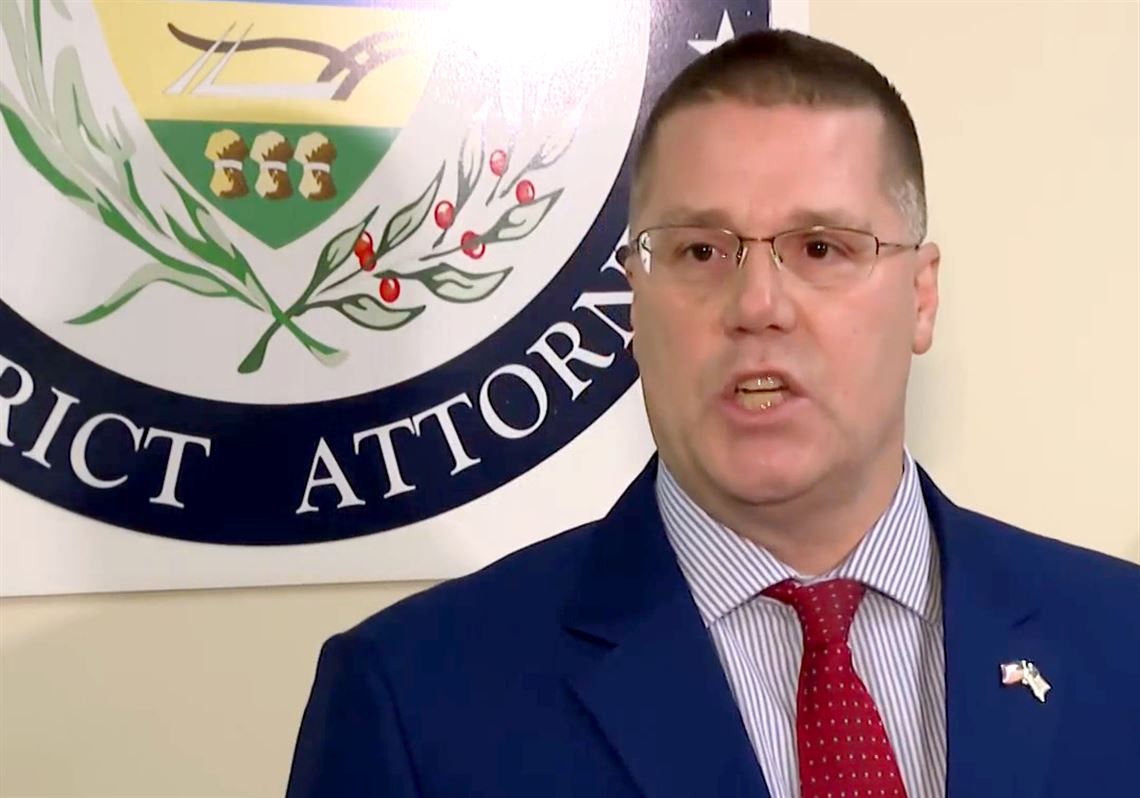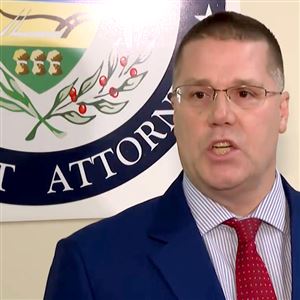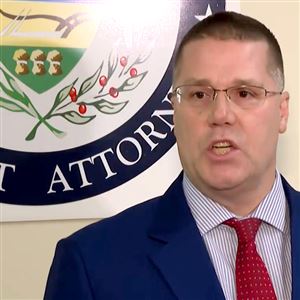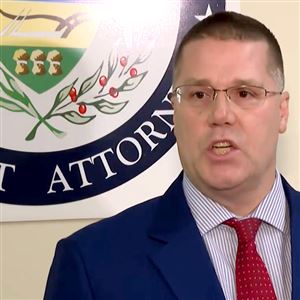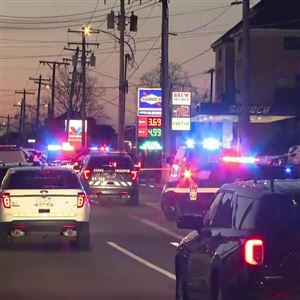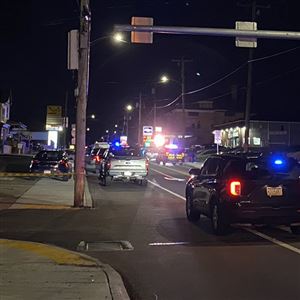Less than a city block separates the building where Washington County Coroner Tim Warco conducts his business on West Beau Street and the ornate courthouse on South Main that houses District Attorney Jason Walsh’s office.
Both men are Republicans, voted into office by county residents to, theoretically, work if not in conjunction with each other, at least professionally alongside each other.
But on Tuesday, investigators from the district attorney’s office raided the coroner’s office with a search warrant. Two days later, they raided the Carnegie law offices of Mr. Warco’s attorney, Timothy Uhrich. The search warrants hint at a possible criminal charge to come — tampering with public records or information. Neither man has been charged.
On Friday came the DA’s request for a restraining order.
The 22-page document seeks to force the coroner and his attorney to turn over any records they have related to a deadly police shooting in Washington earlier this year — and to limit the coroner’s ability to obtain investigative records in the future. A Common Pleas Court judge is expected to take up the matter this week.
It all stems from Mr. Warco’s inquest, or investigation, into the April 2 killing of Eduardo Hoover Jr., 38, who was shot by a Mount Pleasant police officer following a 10-mile pursuit.
Mr. Walsh ruled the shooting justified in early May. Mr. Warco held an inquest, subpoenaed records and video, and ultimately recommended that the DA file manslaughter charges against the Mount Pleasant officer.
A coroner cannot demand or file criminal charges, and Mr. Walsh called the inquest “theatrical nonsense.”
Mr. Uhrich called the DA’s actions those of a bully.
“Now you have a cosplay cop who is trying to push around the coroner,” he said.
Mr. Walsh did not respond to numerous requests for comment.
In Pennsylvania, coroners can conduct an inquest post-autopsy to help determine a cause or manner of death. Among a coroner’s duties during an inquest, according to Pennsylvania law: “Determine whether an individual other than the deceased was criminally responsible by act or neglect and the identity of the individual who may be responsible.”
Coroners also have subpoena power for certain elements of an inquest, including to compel witnesses to testify. They can also use that subpoena power to compel the production of “a paper;” “a document in any form or media, including a medical and mental health record;” and “another thing relative to the investigation or inquest.”
Mr. Walsh’s court filing Friday dismisses Mr. Warco’s use of subpoenas, alleging that he and Mr. Uhrich conspired “to obtain protected and non-public investigative information … through the use of subpoenas related to an irregular and statutorily impotent ‘inquest,’ at which amazingly no inquest jury was empaneled.”
Pennsylvania law does not appear to require a jury, stating only that “the coroner may summon a jury.”
Disagreements between a district attorney and a coroner aren’t unusual, said Duquesne University law professor Bruce Ledewitz.
“What is unusual — and petty — is that this has come to be a matter for a subpoena,” he said. “They are supposed to work together. The fact that they have a disagreement is not supposed to spill over into the newspapers.”
Mr. Ledewitz said that what he sees is “an irritated DA who is upset that the coroner has a different view of the evidence and has shown up the DA publicly,” though he stressed that he has no opinion on which view of that evidence is the correct one.
The search warrants served on the coroner and his attorney cited a portion of the state’s law against tampering with public records or information, specifically the subsection that criminalizes anyone who “intentionally and unlawfully destroys, conceals, removes or otherwise impairs the verity or availability of any such record, document or thing.”
Mr. Ledewitz noted that the text of the law does criminalize making a public record inaccessible.
“If the claim is [the coroner and attorney] are not allowing access,” he said, “that could conceivably, technically, be a violation of the criminal law — but that’s extremely unlikely.”
He offered a further caveat to his interpretation of the law in this situation: “The whole thing is, of course, ridiculous as a criminal matter — and it’s not a criminal matter.”
State law says the coroner “shall consult with and advise the district attorney as may be practicable,” and the district attorney “may act as counsel to the coroner” during inquests.
Mr. Uhrich told the Post-Gazette that he and Mr. Warco did, in fact, meet with Mr. Walsh — as early as April 26. The court filings seem to acknowledge that, noting that prior to Mr. Walsh clearing the officer on May 5, he and Mr. Warco discussed the matter with “Warco seeking to convene an inquest, which he did not do.”
The DA accused the coroner of intentionally waiting until the weeks leading up to the Nov. 7 election — both won re-election — to announce the inquest, which Mr. Walsh referred to in pointed quotation marks throughout the filing. The filing more than once called the inquest or proceedings “impotent.” The filing called the actions of the coroner and his attorney “patently outrageous and intolerable.”
The DA’s request for a restraining order is three-pronged: He’s asking a judge to force the coroner and his attorney to return any materials they have related to the shooting and inquest, destroy copies, and to now send any requests for investigative materials to his office for review.
Mr. Uhrich said if the court grants the relief the district attorney is requesting — specifically placing limitations on what kinds of records the coroner can receive and how he requests them — it will have a chilling effect on coroner inquests.
“Motor vehicle accidents suicides, homicides — anything under the coroner’s jurisdiction relies heavily on reports received,” he said.
The fatal police shooting
Police were initially sent to Hoover’s home when someone called 911 and reported Hoover had nearly struck a child with his truck. He ended up leading officers from Mount Pleasant and Smith townships on a chase from Mount Pleasant to Jefferson Avenue in the city of Washington.
Once on Jefferson Avenue, police have said, Hoover slowed his Dodge Ram. This allowed several officers to position their cruisers in front of and behind the truck, essentially boxing Hoover in.
Hoover pulled forward, hit a utility pole, put his truck in reverse and backed into a police cruiser. Within moments, Mount Pleasant Officer Tyler Evans had shot Hoover twice in the head through the back window of the truck.
Mr. Warco’s inquest — at which Mr. Uhrich questioned witnesses — relied on dashboard camera video from three of the four involved cars, Officer Evans’ body-worn camera footage, security footage from near the scene, and the report compiled by Pennsylvania State Police after the shooting.
The coroner’s attempts to subpoena the officers involved were quashed by Washington County President Judge John DiSalle. The state police officer leading the investigation was subpoenaed but did not appear, and Mr. Warco said he was given 38 pages of the officer’s 260-page report.
According to the inquest, Smith Township Officer Michael Pasquale told investigators he got out of his car and ordered Hoover to get out of the truck. He said Hoover looked at him and reversed his truck, hitting the car Officer Evans was still in. Officer Pasquale fired twice into the truck grill to try to disable it.
Officer Evans told investigators he got out of his car in time to see Hoover’s truck pull forward and hit a utility pole, whereas his bodycam footage shows he was still in the car. Mr. Warco said the footage indicates Officer Evans was still in the car when Hoover reversed into it from three to five yards away.
He said the officer shouts an expletive and then gets out and “immediately fires two rounds through the rear window of the truck.” The coroner indicated that if Mr. Walsh would not file charges, he would forward his findings to the state Attorney General’s Office.
A day after Mr. Warco released his findings, the district attorney blasted the coroner at a press conference. He said Mr. Warco “cherry-picked only select evidence” and dismissed the findings as “theatrical nonsense.”
That appeared to be the end of things.
But on Nov. 21, Mr. Warco and Mr. Uhrich received emails from Mr. Walsh’s office demanding the return of “all copies of law enforcement investigative records and any derivative copies and notes …” The email gave a deadline of noon the next day.
Neither complied.
The search warrant on Mr. Warco’s office was served a week later, followed by the search of Mr. Uhrich’s office in Carnegie on Thursday.
Both men maintain that they are legally in possession of any records or materials they received via subpoena.
The attorney has said he believes he and Mr. Warco were served with the same search warrant, though he can’t be certain: Judge DiSalle, who signed off on the search of Mr. Warco’s office, sealed that warrant. The warrant for Mr. Uhrich’s office, however, was signed by the district judge in Carnegie, Jack Kobistek.
In Pennsylvania, lower courts do not have the authority to seal warrants. Mr. Uhrich said he thinks the move was on purpose.
“They knew there was no [Common Pleas Court] judge in Allegheny County that would sign that affidavit of probable cause,” he said. “It’s a baseless warrant.”
First Published: December 3, 2023, 10:30 a.m.
Updated: December 4, 2023, 8:43 p.m.






